{…}the dismal statistics on child poverty, declaring it an outrage that of the 35 most economically advanced countries, the United States ranks 34th, edging out only Romania. He might take on educational achievement, noting that this country comes in only 28th in the percentage of 4-year-olds enrolled in preschool, and at the other end of the scale, 14th in the percentage of 25-to-34-year-olds with a higher education. He might hammer on infant mortality, where the United States ranks worse than 48 other countries and territories, or point out that, contrary to fervent popular belief, the United States trails most of Europe, Australia and Canada in social mobility.
America is indeed No. 1, he might declare — in locking its citizens up, with an incarceration rate far higher than that of the likes of Russia, Cuba, Iran or China; in obesity, easily outweighing second-place Mexico and with nearly 10 times the rate of Japan; in energy use per person, with double the consumption of prosperous Germany.
Source: "The Opiate of Exceptionalism" By SCOTT SHANE - NY Times - October 19, 2012
"Here is a little dose of reality about where we actually rank today," says Charles M. Vest, the former M.I.T. president who worked on a 2005 study by our National Academies : sixth in global innovation-based competitiveness, but 40th in rate of change over the last decade; 11th among industrialized nations in the fraction of 25- to 34-year-olds who have graduated from high school; 16th in college completion rate; 22nd in broadband Internet access; 24th in life expectancy at birth; 27th among developed nations in the proportion of college students receiving degrees in science or engineering; 48th in quality of K-12 math and science education; and 29th in the number of mobile phones per 100 people.
"This is not a pretty picture, and it cannot be wished away," said Vest.
You’ll have to Google it, though. The report hasn’t received 1/100th of the attention given to Juan Williams’s remarks on Muslims.
A dysfunctional political system is one that knows the right answers but can’t even discuss them rationally, let alone act on them, and one that devotes vastly more attention to cable TV preachers than to recommendations by its best scientists and engineers.
Source: "Can’t Keep a Bad Idea Down" By THOMAS L. FRIEDMAN - NY Times - October 26, 2010
Child Poverty
According to the National Center for Children in Poverty, 42 percent of American children live in low-income homes and about a fifth live in poverty. It gets worse. The number of children living in poverty has risen 33 percent since 2000. For perspective, the child population of the country over all increased by only about 3 percent over that time. And, according to a 2007 Unicef report on child poverty, the U.S. ranked last among 24 wealthy countries.
Source: "Suffer the Little Children" By CHARLES M. BLOW - NY Times - December 24, 2010
Public Transportation
The U.S. Federal Railroad Administration says the term high-speed rail applies to trains traveling more than 90 mph. The European Union standard is above 125 mph.
Many overseas bullet trains -- most powered by overhead electricity lines -- run faster than that. In France, for example, the TGV (''Train a Grande Vitesse'') covers the 250 miles between Paris and Lyon in one hour, 55 minutes at an average speed of about 133 mph.
In Japan, which opened the first high-speed rail in the 1960s and carries more passengers than any other country, the Japanese Shinkansen trains hurtle through the countryside at an average of about 180 mph.
Super-fast trains also run in Germany, Spain and China, at speeds up to 140 mph, according to a 2007 survey in the trade publication Railway Gazette.
The only rail service that qualifies under America's lower high-speed standard is Amtrak's 9-year-old Acela Express route connecting Boston to Washington, D.C.
Source: "Obama: Better Trains Foster Energy Independence" - By THE ASSOCIATED PRESS - NY Times - April 16, 2009
Life Span
The peerless investigative team of Donald Bartlett and James Steele reports in their new book, "Critical Condition: How Health Care in America Became Big Business -- and Bad Medicine," one of our most enduring myths is that we have "world class health care."
"To be sure, it does offer the very best of care to some folks," they write. "It does offer world-class high-tech surgery and some space-age medical procedures. But these benefit 2 or 3 percent of the population at most, along with the richest citizens of other countries who come here for the highly specialized treatment. ... Many countries around the world take far better care of their people, achieve better results for their health care system and do it all with far fewer dollars. ... The statistics are even grimmer when life span is counted in years of healthy living. ... By this measure, the United States in 2002 ranked a distant 29th among the countries of the world, between Slovenia and Portugal."
Source: "Lynching Social Security" by Molly Ivins - Creators Syndicate - 01.06.05
Infant Mortality
Of the 33 countries that the International Monetary Fund describes as “advanced economies,” the United States now has the highest infant mortality rate according to data from the World Bank. It took us decades to arrive at this dubious distinction. In 1960, we were 15th. In 1980, we were 13th. And, in 2000, we were 2nd.
The bad news is that, according to the March of Dimes, the Republican budget passed in the House this month could do great damage to this progress. The budget proposes:
• $50 million in cuts to the Maternal and Child Health Block Grant that “supports state-based prenatal care programs and services for children with special needs.”
• $1 billion in cuts to programs at the National Institutes of Health that support “lifesaving biomedical research aimed at finding the causes and developing strategies for preventing preterm birth.”
• Nearly $1 billion in cuts to the Centers for Disease Control and Prevention for its preventive health programs, including to its preterm birth studies.
This is the same budget in which House Republicans voted to strip all federal financing for Planned Parenthood.
A 2006 study by the Institute of Medicine of the National Academies estimated that premature births cost the country at least $26 billion a year. At that rate, reducing the number of premature births by just 10 percent would save thousands of babies and $2.6 billion — more than the proposed cuts to the programs listed, programs that also provide a wide variety of other services.
Source: "The G.O.P.’s Abandoned Babies" By CHARLES M. BLOW - NY Times - February 25, 2011
In 1960, the United States ranked 12th lowest in the world in infant mortality. By 2004, the last year for which comparative data are available, it had dropped to 29th, tied with Poland and Slovakia. Even with the improvement, it is still likely to rank 29th, far behind many Scandinavian and East Asian countries that report rates below 3.5.
Source: "29th on Infant Mortality" - NY Times - 10/19/08
Here's a wrenching fact: If the U.S. had an infant mortality rate as good as Cuba's, we would save an additional 2,212 American babies a year.
Yes, Cuba's. Babies are less likely to survive in America, with a health care system that we think is the best in the world, than in impoverished and autocratic Cuba. According to the latest C.I.A World Factbook, Cuba is one of 41 countries that have better infant mortality rates than the U.S..
Singapore has the best infant mortality rate in the world: 2.3 babies die before the age of 1 for every 1,000 live births. Sweden, Japan and Iceland all have a rate that is less than half of ours..
If we had a rate as good as Singapore's, we would save 18,900 babies each year. Or to put it another way, our policy failures in Iraq may be killing Americans at a rate of about 800 a year, but our health care failures at home are resulting in incomparably more deaths -- of infants. And their mothers, because women are 70 percent more likely to die in childbirth in America than in Europe. [E]very day, on average, 77 babies die in the U.S. and one woman dies in childbirth..
[F]or all their ruthlessness, China's dictators have managed to drive down the infant mortality rate in Beijing to 4.6 per thousand; in contrast, New York City's rate is 6.5..
[S]ome of the steps the government is now taking or talking about -- like cutting back further on entitlements, particularly those giving children access to health care -- would aggravate the situation. Last year, a study by the Institute of Medicine, a branch of the National Academy of Sciences, estimated that the lack of health insurance coverage causes 18,000 unnecessary deaths a year..
Source: "Health Care? Ask Cuba" by Nicholas D. Kristof - New York Times - 1/12/05
[T]he number of babies who died before their first birthdays amounted to 11.5 per thousand live births in 2002 in Washington, compared with 4.6 in Beijing.
Indeed, according to the United Nations Development Program, an African-American baby in Washington has less chance of surviving its first year than a baby born in urban parts of the state of Kerala in India.
The national infant mortality rate has risen under Mr. Bush for the first time since 1958. The U.S. ranks 43rd in the world in infant mortality, according to the C.I.A.'s World Factbook; if we could reach the level of Singapore, ranked No. 1, we would save 18,900 children's lives each year.
The U.S. ranks 84th in the world for measles immunizations and 89th for polio.
Source: "The Larger Shame" By NICHOLAS D. KRISTOF - NY Times - September 6, 2005
Environment
[Bureau of Ocean Energy Management, Regulation and Enforcement director Michael R. Bromwich] acknowledged that accident rates for offshore drilling were several times higher in the United States than in Australia, Canada, Norway and the United Kingdom, in part because those countries imposed effective new rules after major accidents.
Source: "Regulation of Offshore Rigs Is a Work in Progress" By JOHN M. BRODER and CLIFFORD KRAUSS - NY Times - April 17, 2011
The [2005 index of environmental sustainability] is the second produced in collaboration with the World Economic Forum, which meets in Davos, Switzerland. [T]he ranking [was] prepared by researchers at Yale and Columbia Universities. The report is based on 75 measures, including the rate at which children die from respiratory diseases, fertility rates, water quality, over fishing, emission of heat-trapping gases and the export of sodium dioxide, a crucial component of acid rain.
The United States ranked 45th of the 146 countries studied, behind such countries as Japan, Botswana and the tiny Himalayan kingdom of Bhutan, and most of Western Europe. Finland, Norway and Uruguay held the top three spots. The lowest-ranking country was North Korea. Among those near the bottom were Haiti, Taiwan, Iraq and Kuwait.
Source: "Nations Ranked as Protectors of the Environment" by Felicity Barringer - New York Times - 1/24/05
Education
An international study published last month looked at how students in 65 countries performed in math, science and reading. The winner was: Confucianism!
At the very top of the charts, in all three fields and by a wide margin, was Shanghai. Three of the next top four performers were also societies with a Confucian legacy of reverence for education: Hong Kong, Singapore and South Korea. The only non-Confucian country in the mix was Finland. The United States? We came in 15th in reading, 23rd in science and 31st in math.
“Bad teachers can always be made gym teachers,” a principal in the city of Xian explained to me as she showed me around her kindergarten. In China, school sports and gym just don’t matter.
Source: "China’s Winning Schools?" By NICHOLAS D. KRISTOF - NY Times - January 15, 2011
The brutal truth is that we have fallen from first to ninth in the world in the percentage of college graduates in a generation.
Source: "The School of Hard Drives" Interview with Secretary of Education Arne Duncan by DEBORAH SOLOMON - NY Times - September 16, 2010
The United States gave up its spot as the world leader in college graduation rates about 10 years ago, as students in countries like South Korea, Canada and Russia began to surpass their American counterparts. Now the United States ranks 12th among 36 developed nations; a report by the College Board last month warned that the gap threatens to undermine American competitiveness.
Source: "Obama to Call for Better Graduation Rates" By SHERYL GAY STOLBERG - NY Times - August 9, 2010
[T]he College Board […] tells us that the U.S., once the world’s leader in the percentage of young people with college degrees, has fallen to 12th among 36 developed nations.
[T]he U.S. is 12th among developed nations in the percentage of 25- to 34-year-olds with college degrees.
In that key group, 25- to 34-year-olds with a college degree, the U.S. ranks behind Canada, South Korea, Russia, Japan, New Zealand, Ireland, Norway, Israel, France, Belgium and Australia.
Source: "Putting Our Brains on Hold" By BOB HERBERT - NY Times - August 6, 2010
[B]etween 2000 and 2006 the U.S. fell from seventh to 13th place in science literacy among 15-year-olds who took an international test.
Source: "At NYC Sci Fest, Asking 'What if We're Holograms?'" - THE ASSOCIATED PRESS via NY Times - May 29, 2010
American schools “now graduate 75 percent of our young people from high school.”
That figure has now dropped to less than 70 percent, and the United States, which used to lead the world in sending high school graduates on to higher education, has declined to fifth in the proportion of young adults who participate in higher education and is 16th out of 27 industrialized countries in the proportion who complete college, according to the National Center for Public Policy and Higher Education.
The striking thing about the performance of American students on international comparisons is not that, on average, they are in the middle of the pack — which was also true in 1983 — but that we have a disproportionate share of low-performing students. We are failing to provide nearly one-third of our young people with even the minimal education required to be functioning citizens and workers in a global economy.
Source: "A Nation at a Loss" By EDWARD B. FISKE - NY Times - April 25, 2008
The Program for International Assessment, which compiles reports on the reading and math skills of 15-year-olds, found that the U.S. ranked 24th out of 29 nations surveyed in math literacy. The same result for the U.S. - 24th out of 29 - was found when the problem-solving abilities of 15-year-olds were tested.
Source: "Left Behind, Way Behind" By BOB HERBERT - NY Times - August 29, 2005
The United States, which once led the world in high school graduation rates, has plummeted to 17th -- well behind France, Germany and Japan.
Source: "Reinventing High School" - New York Times - 2/1/05
The Wall Street Journal recently reported that China is graduating four times as many engineers as the United States. (Japan, with less than half our population, graduates twice as many.) Yes, China has a far larger population, but the U.S. supposedly has a far superior educational system.
Perhaps we did once, but we're busy destroying it now. Indeed, the extremist edge of America's religious right has instituted a war on science. The teaching of evolution, which most scientists accept as the foundation of modern biology, is under assault in classrooms from Kansas to Georgia to Pennsylvania.
Source: "Science funding dips in U.S., soars in China" - by Cynthia Tucker - Universal Press Syndicate - 5/16/05
Prisons
For the first time in the nation’s history, more than one in 100 American adults are behind bars, according to a new report.
Nationwide, the prison population grew by 25,000 last year, bringing it to almost 1.6 million, after three decades of growth that has seen the prison population nearly triple. Another 723,000 people are in local jails.
The number of American adults is about 230 million, meaning that one in every 99.1 adults is behind bars.
Incarceration rates are even higher for some groups. One in 36 adult Hispanic men is behind bars, based on Justice Department figures for 2006. One in 15 adult black men is, too, as is one in nine black men ages 20 to 34.
The United States imprisons more people than any other nation in the world. China is second, with 1.5 million people behind bars. The gap is even wider in percentage terms.
Germany imprisons 93 out of every 100,000 people, according to the International Center for Prison Studies at King’s College in London. The comparable number for the United States is roughly eight times that, or 750 out of 100,000.
On average, states spend almost 7 percent of their budgets on corrections, trailing only health care, education and transportation.
In 2007, according to the National Association of State Budget Officers, states spent $44 billion in tax dollars on corrections. That is up from $10.6 billion in 1987, a 127 percent increase when adjusted for inflation. With money from bonds and the federal government included, total state spending on corrections last year was $49 billion. By 2011, the Pew report said, states are on track to spend an additional $25 billion.
It cost an average of $23,876 dollars to imprison someone in 2005, the most recent year for which data were available. But state spending varies widely, from $45,000 a year in Rhode Island to $13,000 in Louisiana.
Source: U.S. Imprisons One in 100 Adults, Report Finds - By ADAM LIPTAK - NY Times - February 29, 2008
Civil Rights
According to the World Justice Project, a nonprofit group promoting the rule of law that got its start through the American Bar Association, the United States ranks 66th out of 98 countries in access to and affordability of civil legal services.
“In most countries, equality before the law means equality between those of high and low income,” remarked Earl Johnson Jr., a retired justice of the California Court of Appeal. “In this country for some reason we are concerned more with individuals versus government.”
Source: "Right to Lawyer Can Be Empty Promise for Poor" By ETHAN BRONNER - NY Times - March 15, 2013
Communications
[T]he U.S. has dropped from the first-ranking broadband country a decade ago to the 16th today, according to rankings from the International Telecommunications Union.
And it’s not just a lack of access (or ‘penetration’ to use the industry lingo)—broadband in the States is also far more expensive on a per capita basis than in places like Canada, Denmark or Taiwan because there is not adequate competition.
Source: "This Side of Democracy" By Stuart Whatley - truthdig.com - 8/30/10
About 70% of American homes do not have affordable broadband. (About 70% of Korean homes do. Korea is number one in the penetration of high speed internet access,) The United States is number 13 and falling.
Source: The News Hour - PBS - Reed Hundt - former FCC Chairman
The Organization for Economic Cooperation and Development ranks America 12th among developed nations for wired Internet access, and it is safe to assume that high prices have played a role in lowering our standing. So America, the country that invented the Internet and still leads the world in telecommunications innovation, is lagging far behind in actual use of that technology.
The answer to this puzzle is regulatory policy. Over the last 10 years, we have deregulated high-speed Internet access in the hope that competition among providers would protect consumers. The result? We now have neither a functioning competitive market for high-speed wired Internet access nor government oversight.
By contrast, governments that have intervened in high-speed Internet markets have seen higher numbers of people adopting the technology, doing so earlier and at lower subscription charges. Many of these countries have required telecommunications providers to sell access to parts of their networks to competitors at regulated rates, so that competition can lower prices.
Meanwhile, they are working toward, or already have, fiber-optic networks that will be inexpensive, standardized, ubiquitous and equally fast for uploading and downloading. Many of those countries, not only advanced ones like Sweden and Japan but also less-developed ones like Portugal and Russia, are already well on their way to wholly replacing their standard telephone connections with state-of-the-art fiber-optic connections that will even further reduce the cost to users, while significantly improving access speeds.
The only thing close is FiOS. But, according to Diffraction Analysis, a research firm, it costs six times as much as comparable service in Hong Kong, five times as much as in Paris and two and a half times as much as in Amsterdam. When it comes to the retail cost of fiber access in America, we do about as well as Istanbul.
Source: "The New Digital Divide" By SUSAN P. CRAWFORD - NY Times - December 3, 2011
Science
President Bush has insisted on a policy that severely limits stem cell research, which not only has the potential for treating several serious diseases but which also could eventually create thousands of new, high-paying jobs. Though the state of California is starting is own stem cell research initiative, much of that cutting-edge science will be developed in other countries.
Writing this month in The Wall Street Journal, Norman Augustine, a former CEO of Lockheed Martin Corp., and Burton Richter, a Nobel laureate in physics, said: "As a percentage of GDP, federal investment in physical science research is half of what it was in 1970. (By contrast), in China, R&D expenditures rose 350 percent between 1991 and 2001, and the number of science and engineering Ph.D.s soared 535 percent."
Source: "Science funding dips in U.S., soars in China" - by Cynthia Tucker - Universal Press Syndicate - 5/16/05
Women's Rights
The World Economic Forum measured the size of the gap between women and men in terms of economic participation, economic opportunity, political empowerment, educational attainment, and health and well-being in 58 countries. Sweden, Norway, Iceland, Denmark and Finland were the top five, with 10 European Union members in the top 15 positions. (The United States ranked 17th.) Clearly, much is going well for women in Europe.
Source: "European news media is bastion of gender bias" by Sheila Gibbons - Women's eNews - 6/29/05
Worker Productivity
France ranks fifth in the world in terms of gross domestic product per hour worked, just behind the United States, according to a July report from the U.S. Bureau of Labor Statistics. (Norway, with its oil wealth and tiny population, ranked No.1, followed by Belgium and the Netherlands.)
Source: "Suicides in France Put Focus on Workplace" By DAVID JOLLY and MATTHEW SALTMARSH - NY Times - September 29, 2009
Internet Quality
The most advanced broadband connections are in South Korea, Japan and Sweden, according to the study, conducted by the Saïd Business School at Oxford and the University of Oviedo in Spain, and sponsored by Cisco Systems, the telecommunications equipment maker. Sixteen more countries, including the United States, France and Germany, fell into the second-highest category, meaning that the average Internet connection “comfortably” handles the needs of consumers for popular Web uses today, including social networking and low-definition video streaming. For the United States, that was a jump from last year, when the average Internet connection only barely met users’ needs, according to the survey. "Last year, it was quite painful for the U.S.," [Fernando Gil de Bernabé, a senior director at Cisco] said. "This year it showed a big improvement." But the United States still ranked behind such poorer countries as Bulgaria and Romania, the survey showed. Internet connections in Eastern Europe are often superior because network operators invested straight into the latest equipment, leapfrogging past broadband providers in other countries. Japan, South Korea and France are at the top of its list for speed, while the highest market penetration is in Denmark, the Netherlands and Norway, the [Organization for Economic Cooperation and Development] said. [T]he Cisco-sponsored researchers created an overall index of “broadband leadership” including the performance scores and market penetration. By that measure, South Korea ranked highest, followed by Japan and Hong Kong, with the United States ranking 15th.
Source: "Broadband Speeds Surge in Many Countries" By ERIC PFANNER - NY Times - September 30, 2009
Worker's Rights
{T}he United States is among the least generous in the world, ranking down with the handful of countries that don’t offer any paid leave at all, among them Liberia, Suriname and Papua New Guinea.
The American situation hasn’t materially improved since the landmark Family and Medical Leave Act was signed into law 20 years ago this month by President Clinton. The law requires larger employers and public agencies to provide up to 12 weeks of unpaid leave — as well as continuation of health benefits — for the birth or adoption of a child, or to care for an opposite-sex spouse, a parent or a child who has fallen ill (or to deal with your own health problem).
But about 40 percent of workers fall through the cracks because the law only requires many companies with 50 or more employees to comply. To get the benefit, employees must also have worked for the company for at least a year and logged 1,250 hours within the last 12 months. And lots of people simply cannot afford to take unpaid leave.
According to the Bureau of Labor Statistics, only 11 percent of all private industry workers have access to paid family leave (16 percent of state and local government employees have access to some paid family leave; federal workers don’t get any, though all employees may be able to use accrued sick leave).
Even the policies at some of the most generous American companies pale in comparison with the 31 countries that provide a year or more of paid maternity leave
While the United States takes great pride in its family values, it is the only high-income country that does not offer a paid leave program. (Eight countries in all don’t offer the benefit, according to Dr. {Jody Heymann, dean of the Fielding School of Public Health at the University of California, Los Angeles}.) Most of Europe and Central Asia — or 38 of 53 countries — provide 26 weeks or more of paid leave for mothers, according to Dr. Heymann’s research. “Twenty years ago there were a few other advanced economies that did not yet provide paid leave, and now, the U.S. is entirely isolated,” she said.
Source: "In Paid Family Leave, U.S. Trails Most of the Globe" By TARA SIEGEL BERNARD - NY Times -- February 22, 2013
Okay, okay….we are number one in a few things besides fist-size. We are the number one emitter of carbon polution into the atmosphere. Forgot that one. Also, we also have a larger proportion of our population in prison than any other country. (2.1 million people according to the New York Times - 3/10/05)
We're Number One!!!
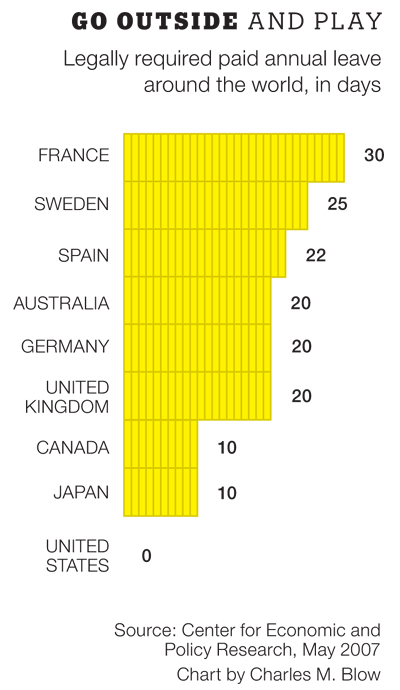
Source: NY Times - 8/5/07
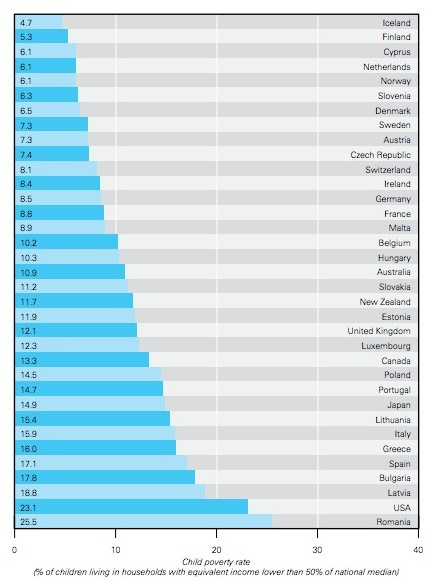
According to UNICEF, 23.1% of American children under the age of seventeen live in poverty, which makes the United States rank second out of thirty-five economically advanced countries ranked in that category. Romania ranks first, with 25.5% of children living in poverty
Source: http://rankingamerica.wordpress.com/
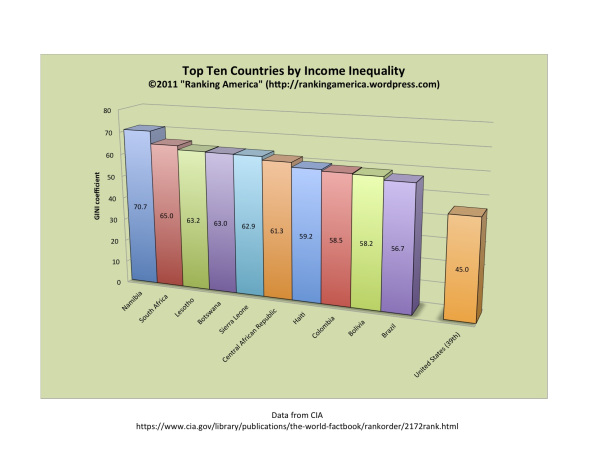
According to the CIA World Factbook, the United States has family income distribution Gini Index score of 45.0, which makes the United States rank thirty-ninth out of one hundred and thirty four countries in that category. Namibia ranks first, with a Gini index score of 70.7. Previously, the United States ranked forty-third in this category. The higher the Gini Index score, the greater the degree of income inequality. Sweden has the lowest score, at 23.0.
Source: http://rankingamerica.wordpress.com/
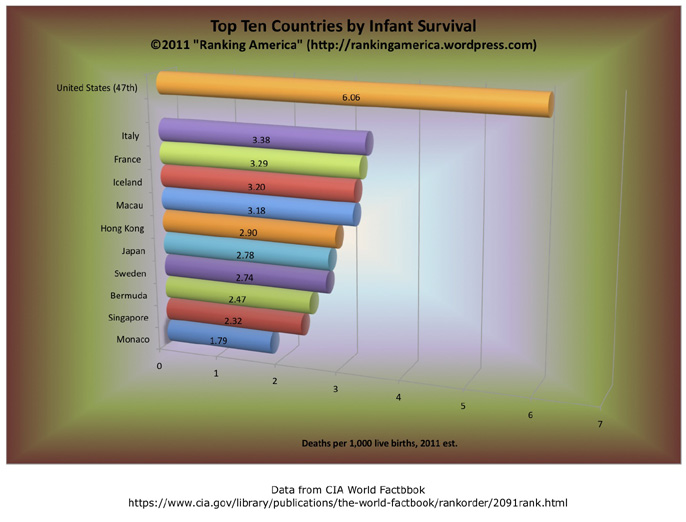
According to the CIA World Factbook, in 2011 it is estimated that 6.06 infants die per 1,000 lives births in the United States, which makes the United States tied for forty-seventh with the Faroe Islands in that category. Monaco ranks first, with 1.79 deaths per 1,000 live births
Source: http://rankingamerica.wordpress.com/

According to the OECD in 2008 the U.S. ranks second out of 33 countries in out of pocket health expenses. The average per person out of pocket health expense in the U.S. is $912. Switzerland ranked first with a cost of $1424 (U.S. dollars) per person
Source: http://rankingamerica.wordpress.com/
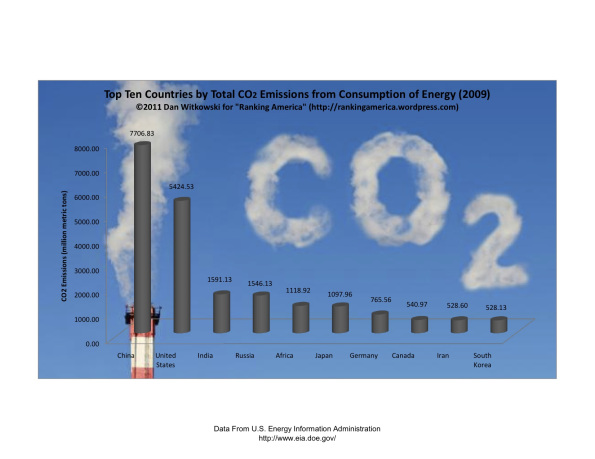
According to data from the U.S. Energy Information Administration, in 2009 the United States emitted 5,424.53 million metric tons of Carbon Dioxide from the consumption of energy, which is enough to make the United States rank second in that category. China ranks first, emitting 7706.83 million metric tons of Carbon Dioxide
Source: http://rankingamerica.wordpress.com/

According to the OECD, in 2009, the United States had a long-term unemployment rate of 16.3%. This is enough to make the United States rank twenty-third out of the thirty-four participating OECD countries in that category. Slovakia ranks first with a long-term unemployment rate of 50.9%
Source: http://rankingamerica.wordpress.com/
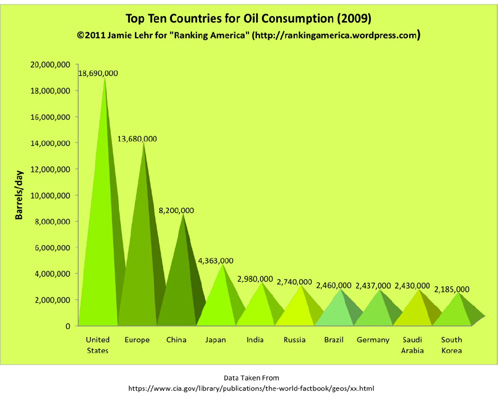
According to the CIA Worldfact Book, in 2009 the United States used about 18.69 million barrels of oil per day. That’s enough for the U.S. rank first in that category
Source: http://rankingamerica.wordpress.com/
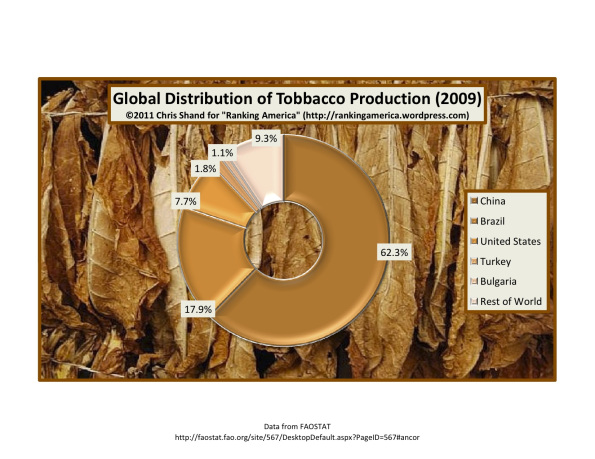
According to data from FAOstat in 2009, the United States produced 373,440 tonnes of tobacco, or 7.7% of the world’s tobacco supply. That is enough for the United States to rank third in that category. China ranked first, producing 3,001,725 tonnes, or 62.3% of the world total
Source: http://rankingamerica.wordpress.com/
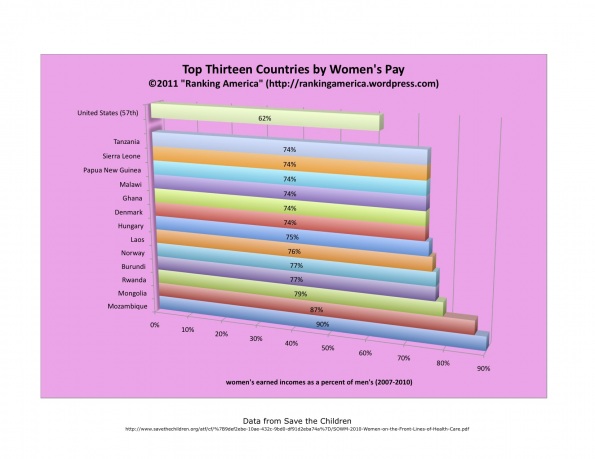
According to Save the Children, in 2010 women in the United States earned, on average, 62% of what men earned, a ratio that makes the United States tied for fifty-sixth (with Switzerland) in that category. Mozambique ranks first, with women earning 90% of what men earned
Source: http://rankingamerica.wordpress.com/
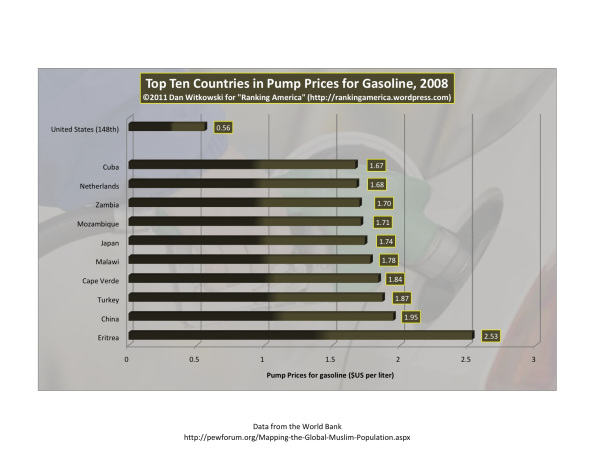
According to the World Bank, Americans in 2008 paid $ 0.56 per liter at the gas pumps making the United States rank one hundred and forty-eighth of one hundred and sixty-seven countries ranked in that category. Eritrea ranked first, paying $2.53 per liter at the gas pumps
Source: http://rankingamerica.wordpress.com/
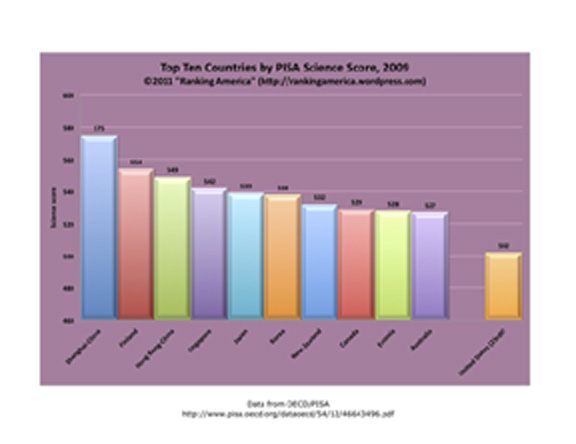
According to the Programme for International Student Assessment, American students scored 502 in the science component of the 2009 PISA assessment. That was enough for the United States to rank twenty-third out of sixty-five ranked economies. China-Shanghai ranked first with a score of 575
Source: http://rankingamerica.wordpress.com/
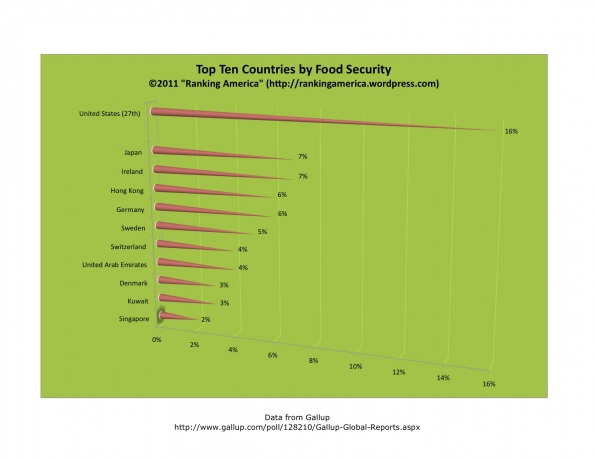
According to Gallup, 16% of Americans stated that they did not have enough money to buy needed food at some point within the past twelve months. That is enough to make the United States tied for twenty-seventh with Syria, Lithuania, and South Korea, out of one hundred thirteen countries ranked in that category. Singapore ranked first, with 2% of residents reporting not having enough money to buy needed food
Source: http://rankingamerica.wordpress.com/
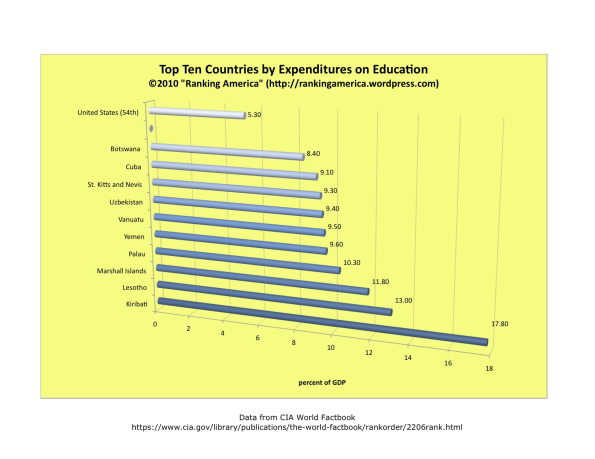
According to the CIA World Factbook, in 2005 the United States spent an estimated 5.30% of its GDP on education, which makes the United States tied for fifty-fourth in that category with Belize, Jamaica, and the Netherlands, out of one hundred eighty-two ranked countries. Kiribati ranks first, at 17.80%
Source: http://rankingamerica.wordpress.com/
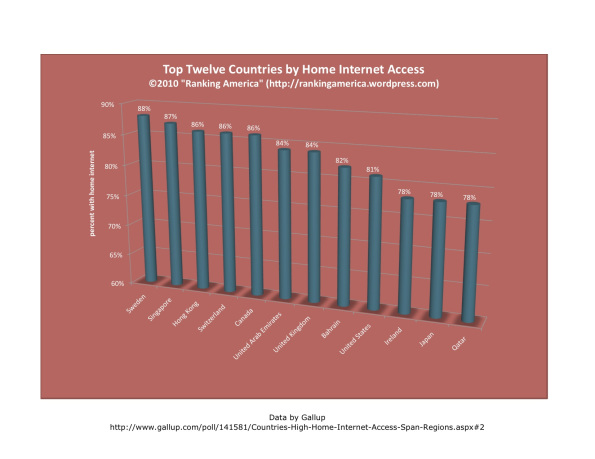
According to a 2009 study by Gallup, 81% of American homes have internet access, which makes the United States rank ninth out of one-hundred-sixteen countries ranked in that category. Sweden ranks first, at 88%
Source: http://rankingamerica.wordpress.com/
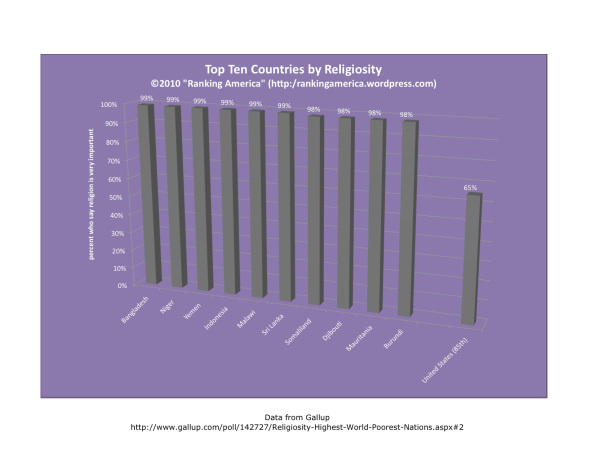
According to a 2009 survey by Gallup, 65% of Americans say that religion is very important in their daily lives which makes the United States rank eighty-fifth out of one-hundred-and-fourteen countries ranked in that category. Bangladesh and Niger tied for first, at greater than 99%
Source: http://rankingamerica.wordpress.com/

According to the website, toptenreviews.com, in 2006 the pornography industry in the United States had per capita revenues of $44.67, which makes the United States rank seventh in that category. South Korea ranked first, with per capita pornography revenues of $526.76
Source: http://rankingamerica.wordpress.com/
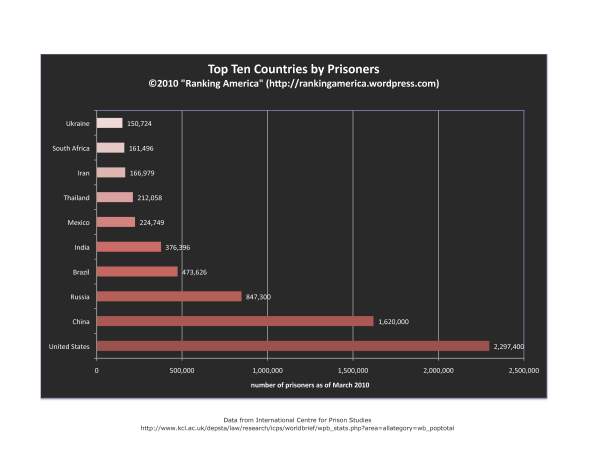
According to the International Centre for Prison Studies, as of March 2010 there are 2,297,400 prisoners in the United States, which makes the United States rank first in that category out of two hundred eighteen ranked countries
Source: http://rankingamerica.wordpress.com/
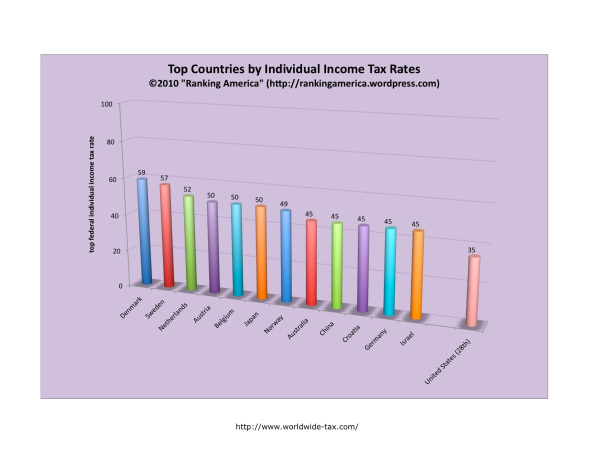
According to worldwide-tax.com, the top federal individual income tax rate in the United States is 35%, which makes the United States tied for twenty-eighth with several other countries out of sixty-two ranked countries. Denmark ranks first, with a top income tax rate of 59%
Source: http://rankingamerica.wordpress.com/
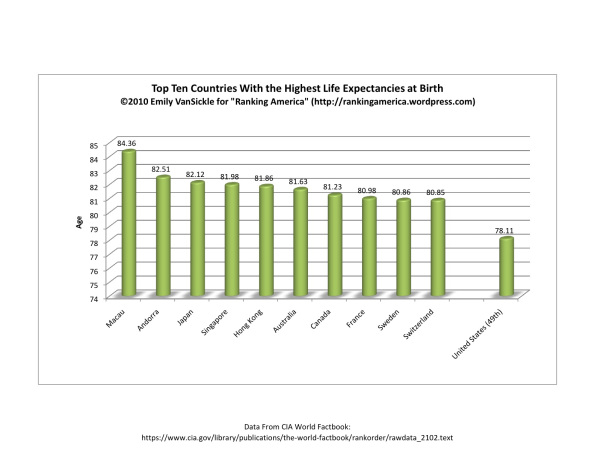
According to the CIA World Factbook, the Unites States has a life expectancy of 78.11 years at birth, which makes the United States rank forty-ninth in that category out of 224 countries ranked in 2009. Macau ranks first with a life expectancy of 84.36 years
Source: http://rankingamerica.wordpress.com/